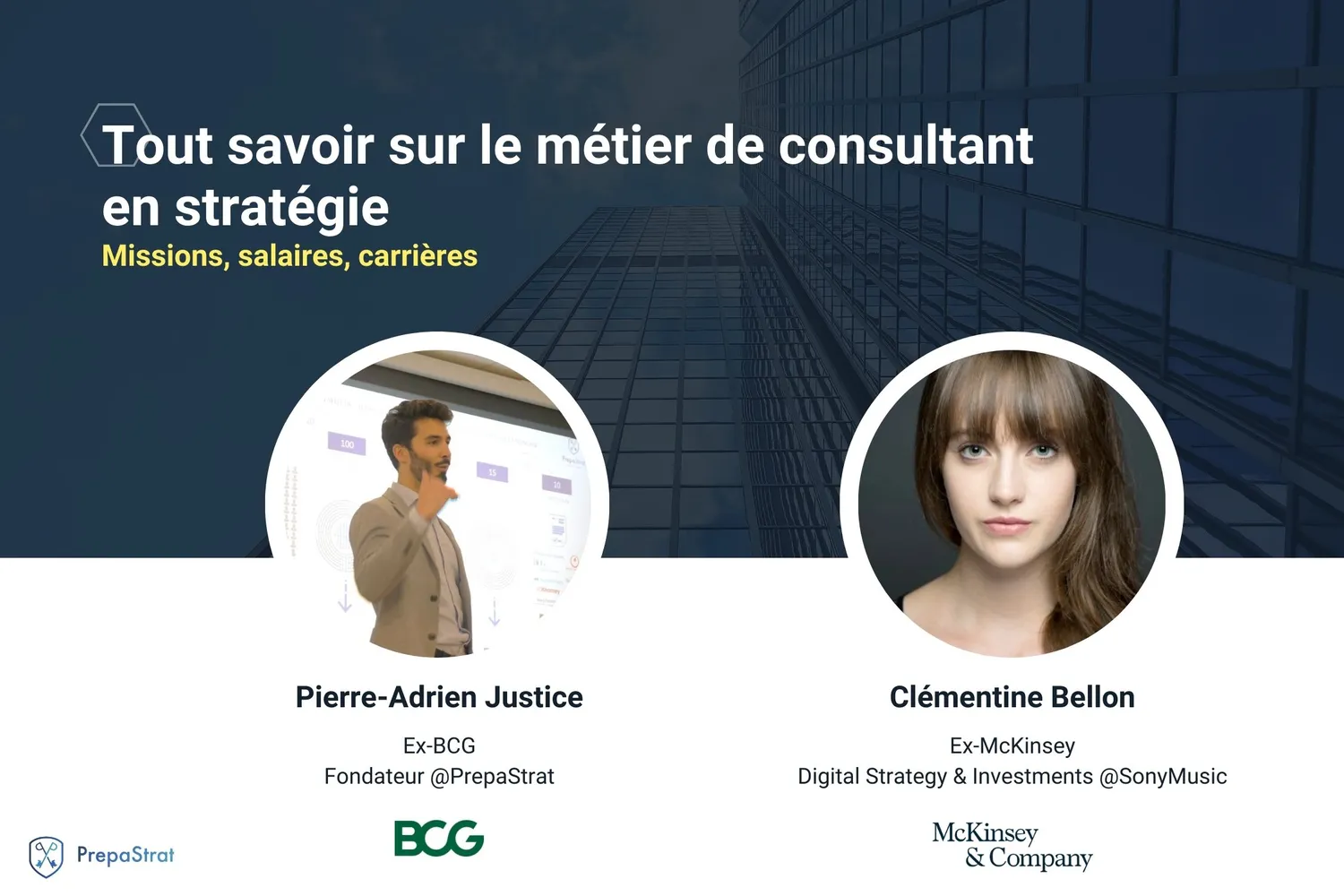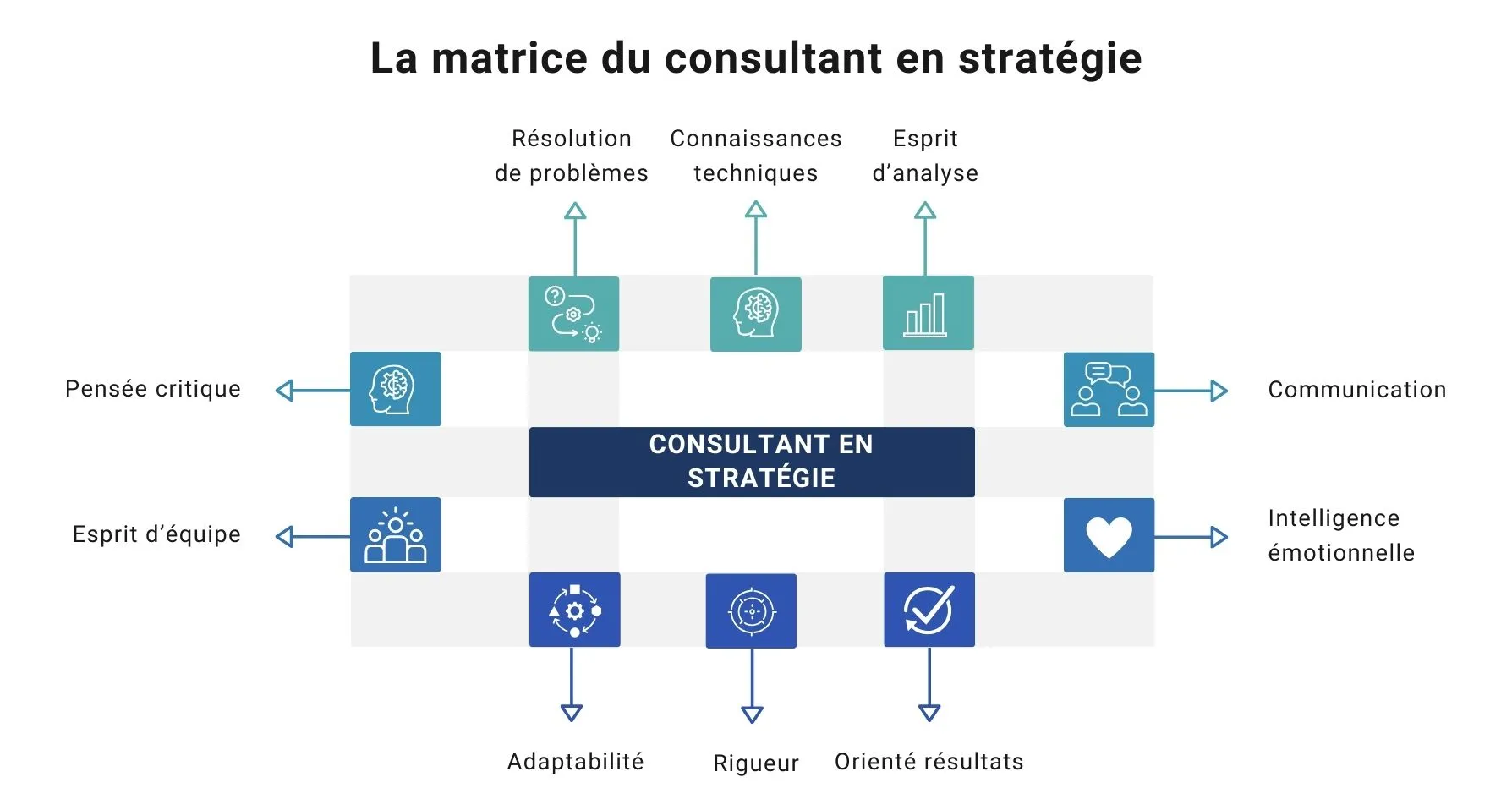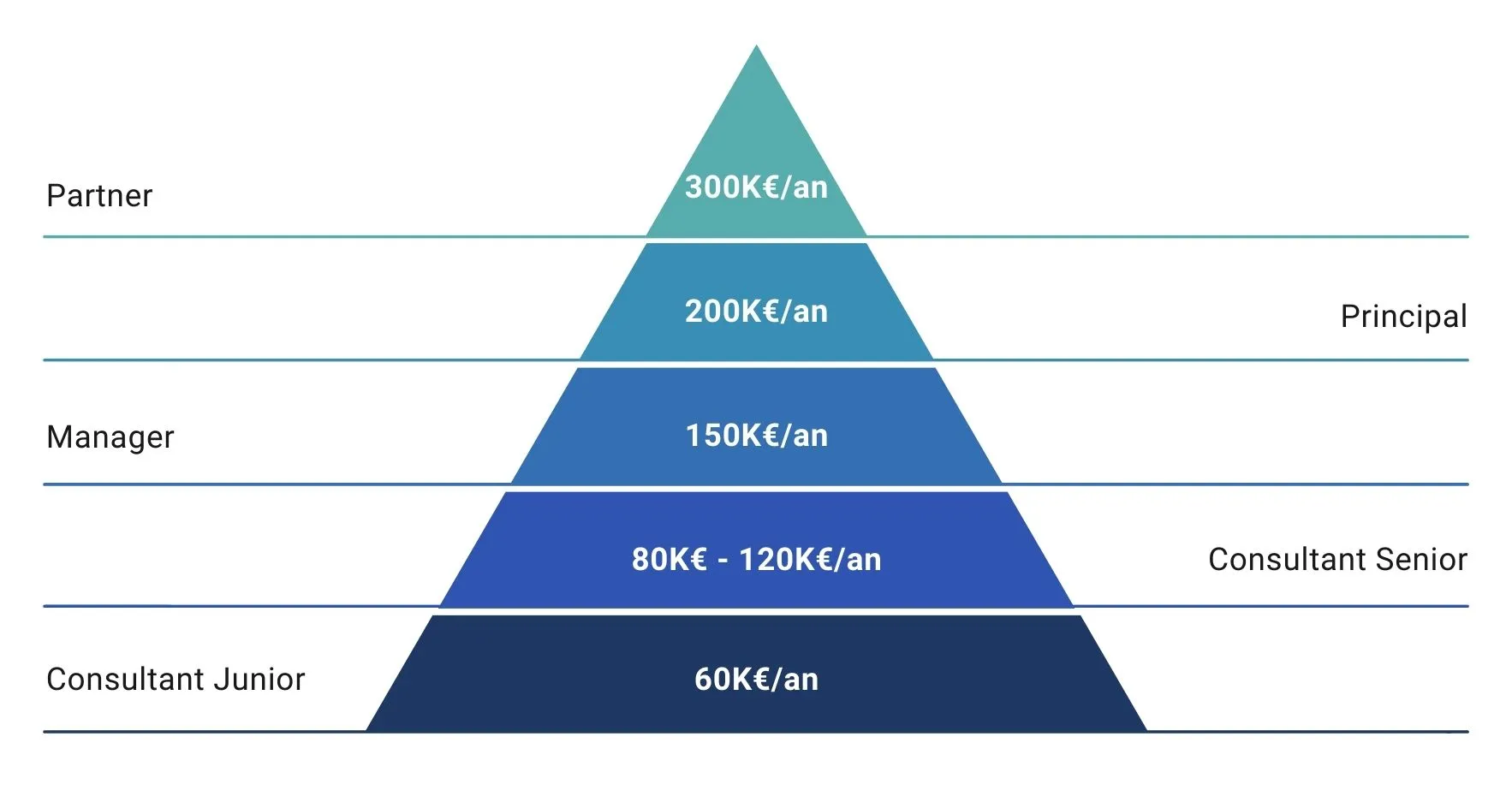
The business of strategy consulting is a mystery to many. From McKinsey to Oliver Wyman, via Bain, BCG, Roland Berger and Kearney, these firms and many others are home to the world's top strategy consultants. Yet few people really know the role, the missions, the day-to-day lives of these strategy consultants. Who are these men and women behind the scenes, for whom a client can spend between €1,200 and €3,000 per day for a single strategy consultant, and up to €10,000 per day for Partners - rates that vary greatly depending on the complexity of the task, the number of consultants involved and their level of experience.
In this article, we present everything you need to know about strategy consultants: roles, missions, careers, salaries, advantages and disadvantages.
Strategy consultant at McKinsey, BCG, Bain and others...but what is it?
The strategy consultant is a true orchestra conductor, whose objective is to carry out a consulting mission in response to his client's needs. Thanks to a proven methodology, precise skills and qualities, the strategy consultant ensures his client's formidable efficiency in all matters, even the most complex.
What exactly does a strategy consultant do?
The consultant's role is to initiate, guide and execute specific consulting assignments for his clients. In addition to analysis, recommendations and implementation, the strategy consultant offers a number of advantages.
- Unrivalled expertise for a customer who needs to outsource a process they don't know or can't do themselves. In this way, strategy consultants complement a company's in-house know-how. It also often proves less costly to call on a consultancy than to recruit equivalent profiles to add skills in-house. What's more, the advantage of calling on a consulting firm is that it will directly and punctually assign its specialized consultants to respond to the issues facing the customer, thus offering the company greater responsiveness and flexibility.
- An outside, fresh look at internal problems and an unbiased approach to finding solutions. Indeed, it can be difficult for a decision-maker to step back far enough to pinpoint the aspects that need to be reviewed and resolved. Consultants are often quicker to identify the problems that are holding a company back. What's more, because they are not internal to the company, consultants can talk openly about real problems and propose solutions without fear of being judged or retaliated against.
- Legitimizing decisions to support decisions that may already have been made. In this case, the consulting firm's role is more to legitimize management's decisions, rather than to bring new elements to the table. This is all the more true in the case of a major consultancy, which will add its "stamp" to a study to make it more acceptable, because the firm's brand image and prestige provide "reassurance". Some decision-makers are therefore prepared to pay strategy consultants to ensure greater legitimacy internally.
See also: What is strategy consulting?
Technical skills and human qualities: the assets of strategy consultants
To best carry out their mission, strategy consultants need to mobilize the skills and qualities that will enable them to adapt to their client's specific needs.

Skills :
- Problem solving: Ability to quickly solve complex problems on assignments using creative and analytical approaches.
- Analytical skills: Ability to evaluate packages, identify opportunities and challenges, and formulate recommendations based on analytical work.
- Technical knowledge: Mastery of the firm's tools and methodologies, as well as skills specific to the mission's sector of intervention.
- Critical thinking: The ability to critically evaluate information, question assumptions and make informed decisions.
- Communication: Ability to communicate clearly and effectively, both in writing and orally, to convey complex ideas in an accessible, top-down manner.
Qualities :
- Rigor: Ability to work with precision and follow a methodical approach in analyzing and solving problems.
- Adaptability: Ability to adjust to rapid changes in the business environment and to approach new assignments with flexibility.
- Team spirit: Ability to work effectively in multidisciplinary teams, collaborating with different profiles.
- Results-oriented: Committed to meeting targets on time and generating tangible results for our customers.
- Emotional intelligence: The ability to understand and manage one's own emotions and those of others with empathy, fostering relationships with customers and colleagues.
Typical profile of strategy consultants, with one thing in common: graduates from top schools (HEC, ESSEC, ESCP, l'X)
The typical profile of a strategy consultant is very clear-cut, although strategy consulting firms are gradually opening up to other profiles. From academic training to professional experience, strategy consultants often have the same background.
Academic training :
- Student in a Top 4 business or engineering school.
- Rank A: HEC, ESSEC, ESCP, Polytechnique, Les Ponts, Les Mines, Centrale Paris
- Rank B: Sciences Po Paris, EM Lyon, EDHEC, Dauphine
- Academic background: Preparatory classes for business and engineering schools.
Professional experience :
- At least one or two six-month internships, with a preference for demanding, selective experiences involving substantial workloads and responsibilities.
- Category A (Highly valued) : Strategy consulting, M&A/Private Equity
- Category B: Strategic company management, start-ups
- Category C: Management consulting, auditing
See also : How to join a strategy consulting firm
Roles and missions of a strategy consultant
Strategy consultants have different roles and missions as they progress through the firm. With each change of grade, approximately every 2 years, a strategy consultant will have a different role characterized by increasing responsibility.
From junior consultant to senior consultant: analysis and problem-solving
At the very beginning of their career, Junior Consultants are primarily assigned to the production of deliverables and analyses, and to the formatting of geographic and competitive benchmark data. He/she will also be responsible for interviewing and reporting on experts in the field.
The two key missions of a Junior Consultant are :
- Production of deliverables: Collect, process and interpret data and information, and convey them in the form of deliverables, using Excel and PowerPoint.
- Collective participation: Participate in brainstorming sessions and workshops with the mission team.
After an average of 2 years, the Junior consultant becomes Senior, and takes on a new role, namely determining the nature of the analyses and deliverables required to meet the customer's order. Thanks to the skills acquired during their apprenticeship phase, Senior consultants now take on the role of managing Junior consultants, supervising and correcting the latter's production of deliverables and analyses. Senior consultants broaden their responsibilities within the company and increase their contribution to customer projects during their assignments.
After 4 years' service, strategy consultants become real managers
On average, each grade lasts 12 to 24 months, so strategy consultants usually reach their first Manager grade in their 4th year. At this point, many of them decide not to continue and leave the firm, the average tenure of a strategy consultant being 4 to 5 years.
As a strategy consultant, the rank of Manager plays a crucial dual role, both for the team and the client.
- Supervise teams: Supervision of Junior and Senior consultants, distribution of tasks, verification of deliverables and Partner's intermediary reference on mission execution.
- Customer communication: Responsible for the production of deliverables, contact person for middle management and responsible for the organization of workshops.
Acting as the linchpin of a team, the Strategy Consulting Manager 's role is to ensure that the assignment runs smoothly, both for his teams and for the client. Managers often specialize in one of the firm's functional or sectoral areas of expertise.
After 7 to 11 years, it's the strategic roles of Strategy Consulting, from Principal to Partners
Principals and Partners are the most experienced strategy consultants. In addition to their role as project managers, they have taken on a new role as business providers. On the one hand, they are responsible for the overall management of several teams of Juniors, Seniors and Managers working simultaneously on different projects. On the other hand, they now have a commercial role: they maintain relations with the company's past customers to generate new assignments, and solicit new customers to open up new markets.
After an average of 7 years, Managers become Principals within the firm, a highly strategic and managerial role.
- Strategic: Responsible for the firm's clients, sales proposals to develop new markets and sell new assignments, participation in the firm's public events and sometimes in charge of research.
- Managerial: Management of several assignments at once, direct link with managers in the field, and active recruitment of consultants.
After an average of 11 years, according to the Consultor in 2022 study, which can be found here, the evolution of the strategy consultant has reached its grail: the position of Partner. Mainly involved in sales, the Partner is responsible for recruiting consultants and managing and developing the client portfolio. He or she holds shares in the firm. Last but not least, he or she is the firm's official representative throughout the world, with the aim of expanding the firm's influence.
Strategy consulting: Salaries and training vs. Pace of life
Now that you have a better understanding of what a strategy consultant is, it's worth looking at the pros and cons of the job. Salary is often cited as one of the main advantages, but it's not the only one. The stimulating work environment in which strategy consultants evolve, both inside and outside the firm, and the career prospects this opens up, are also advantages of the profession. However, these positive aspects need to be balanced against the more difficult ones.
Strategy consultant salaries: from €60K at the start to over €300K after 10 years

Remuneration is one of the main levers for retaining existing strategy consultants. Most of the time, new consultants plan to spend a few years in the firm. On average, strategy consultants receive a salary increase of around 10% per annum, with a real increase in the fixed portion at every promotion. The bonus is variable, indexed to performance and that of the firm. The salaries given below are the average packages of the best firms, including fixed part and bonus.
- Junior Consultant: €60K/year. Median salary: €60K/year all-inclusive. By way of comparison, the typical median salary for graduates with 5 years' higher education is around €35K/year. Of course, these figures depend enormously on the prestige of the firm, but strategy consulting is one of the most attractive sectors for graduates in terms of remuneration.
- Senior Consultant: 80K€-120K€/year. More responsibility and seniority, salary increases according to the firm and performance, representing a handsome increase on the entry-level salary.
- Manager: €150K/year. The pivotal rank in the careers of strategy consultants, the manager grade also gets a handsome pay rise. Firms are keen to retain their talents, who generally leave at this stage for a new career. From this grade onwards, the variable part of the salary can be increasingly significant, and in the event of good performance, can exceed 100€K/year.
- Principal: 200€K/year. From the principal position upwards, strategy consultants are judged primarily on performance, and so the variable part is very important.
- Partner: from 300€K/year. Remuneration is quintuple that of a junior consultant and, in fact, has no ceiling, reaching up to a few million euros.
Read also : All you need to know about strategy consulting salaries
Strategy consultants, a 3rd training cycle: missions, skills, careers
There's more to being a strategy consultant than just the salary - there are other professions that pay even better, such as investment banking. Strategy consulting is also known as a 3rd cycle training course.
Firstly, assignments offer strategy consultants great sector diversity , enabling them to work on different industries and business models with a wide variety of assignment types. What's more, with a bit of luck, staffing can take place on assignments that are particularly meaningful to the consultant. For example, in 2021, BCG was commissioned by the French government to study its strategy for reducing CO2 emissions in France by 2030. Read more in this article from Les Echos.
Strategy consultants also acquire a large number of cross-disciplinary skills. Strategy consulting firms devote time to training consultants in both hard and soft skills. Over the course of their assignments, consultants acquire not only technical skills that can be reused in their future jobs, but also managerial skills such as project management, team leadership, customer relations, etc. There are many opportunities for international mobility, whether through an assignment or by joining a foreign office for a temporary or indefinite period. This international and cultural openness is a great asset for the rest of a strategy consultant's career.
Last but not least, strategy consultants have excellent career prospects if they don't want to stay with the firm. Thanks to their network and the firm's network, they can go on to work for one of their clients, for example, in strategic management or in an investment fund. For others, it's an entrepreneurial adventure, building on the skills they have acquired throughout their career as a strategy consultant.
Read also : Top 5 reasons to join a strategy consulting firm
Pace, travel, up-or-out: the underbelly of the strategy consultant's job
Behind the attractive salaries, training and career prospects lie the tougher aspects of being a strategy consultant. These include the pace dictated by frequent travel and long hours, as well as the pressure from superiors and clients resulting from an up-or-out policy.
The rhythm of life for a strategy consultant involves long working hours, from 9am to 8pm on normal assignments, up to 11pm for intense assignments, and even longer for really intense ones. Added to this is frequent travel to client sites, which are rarely located in the heart of the city. So, a strategy consultant will spend his week working late at the office or at the client's, then in transport and hotels. With a couple or family life, this can become complicated to manage, depending on the assignment, although firms are increasingly careful to strike the right balance.
Another difficult aspect for strategy consultants to manage is the pressure of working on highly strategic subjects of great importance to their customers. The pressure will even be doubled with that of the client and the Partner. Finally, if the firm has an up-or-out policy - in other words, if you don't perform well, you're out - then the pressure can be even more intense. In reality, this is less and less the case, but it goes without saying that a strategy consultant has to perform quickly.
In a few words, the job of a strategy consultant: 3 things to remember
Now you know all about strategy consultants: their role, their missions, their advantages and disadvantages. Here are 3 things to remember from this article:
- Role: The strategy consultant brings unrivalled expertise and an outside, impartial view of the customer's internal issues, enabling rapid identification of problems and solutions.
- Missions : Strategy consultants mobilize different skills and qualities throughout their career, depending on the grade they occupy: a strong commitment to customer projects at the outset, then increasing responsibility until they become true managers, and finally sales targets.
- Pros and cons: The strategy consultant's career path, from junior to partner, offers a good salary that increases over time, as does the intense pace of life and pressure.
Want to become a strategy consultant?
Then join us and be part of the 90% of our candidates who integrate a TOP 6 every year. PrepaStrat is the first interview preparation program for strategy consulting firms, with :
- 6 years of expertise, we're the oldest player in strategy consulting interview preparation
- 6 bootcamps per year, comprising 35 hours of training over 5 days
- 1 referent coach from an MBB for each supported candidate
- 100% of our coaches are Senior Consultants and Managers from McKinsey, BCG and Bain
- 6 online training modules to prepare you for interviews and understand what Strategy Consulting is all about
- 50+ corrected case studies that have already been published by top strategy consulting firms
- Aim for excellence and join the top strategy consulting firms with PrepaStrat
Discover our bootcampour on-the-job interviews and our e-learning platform !